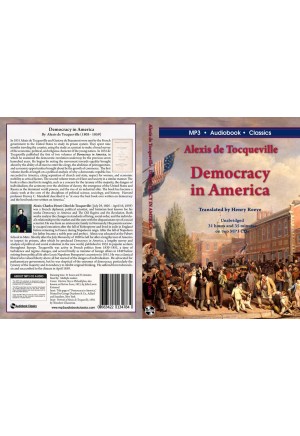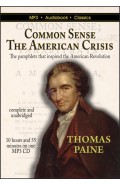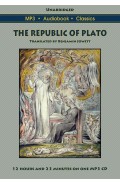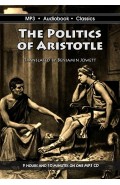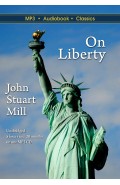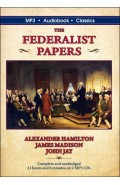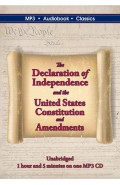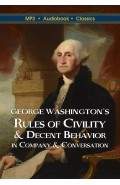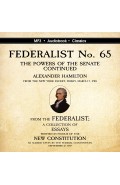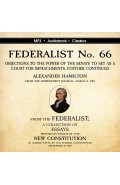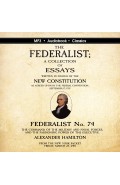| VOLUME I - DISC 1 | |||
| Track | Section | Reader | Length |
| 1 | 00 - Introduction & Special Introduction | Anna Simon | 33:29 |
| 2 | 01 - Exterior Form Of North America | Anna Simon | 20:30 |
| 3 | 02:1 - Origin of the Anglo-Americans - Part 1 | Founding Father | 26:17 |
| 4 | 02:2 - Origin of the Anglo-Americans - Part 2 | Founding Father | 31:32 |
| 5 | 03 - Social Conditions Of The Anglo-Americans | Anna Simon | 20:58 |
| 6 | 04 - The Principle Of The Sovereignty Of The People In America | Sibella Denton | 7:08 |
| 7 | 05:1 - Necessity Of Examining The Condition Of The States - Part 1 | Sibella Denton | 31:50 |
| 8 | 05:2 - Necessity Of Examining The Condition Of The States - Part 2 | Sibella Denton | 20:06 |
| 9 | 05:3 - Necessity Of Examining The Condition Of The States - Part 3 | Sibella Denton | 32:16 |
| 10 | 06 - Judicial Power In The United States | Anna Simon | 19:46 |
| 11 | 07 - Political Jurisdiction In The United States | Sibella Denton | 13:30 |
| 12 | 08:1 - The Federal Constitution - Part 1 | Mim Ritty | 28:11 |
| 13 | 08:2 - The Federal Constitution - Part 2 | radioreader | 32:55 |
| 14 | 08:3 - The Federal Constitution - Part 3 | Bob Tassinari | 26:59 |
| 15 | 08:4 - The Federal Constitution - Part 4 | Bob Tassinari | 28:10 |
| 16 | 08:5 - The Federal Constitution - Part 5 | Bob Tassinari | 33:49 |
| 17 | 09 - Why The People May Strictly Be Said to Govern | Gary Gilberd | 3:02 |
| 18 | 10 - Parties in America | Gary Gilberd | 20:25 |
| 19 | 11 - Liberty of the Press in the United States | Chrisitan Pecaut | 32:48 |
| 20 | 12 - Political Associations In The United States | Sibella Denton | 20:04 |
| 21 | 13:1 - Government of the Democracy in America - Part 1 | Leon Mire | 34:35 |
| 22 | 13:2 - Government of the Democracy in America - Part 2 | Leon Mire | 28:53 |
| 23 | 13:3 - Government of the Democracy in America - Part 3 | Leon Mire | 28:30 |
| 24 | 14:1 - Advantages American Society Derives From Democracy - Part 1 | Joshua B. Christensen | 26:57 |
| 25 | 14:2 - Advantages American Society Derives From Democracy - Part 2 | Joshua B. Christensen | 16:23 |
| 26 | 15:1 - The Unlimited Power of the Majority and Its Consequences - Part 1 | Founding Father | 13:48 |
| 27 | 15:2 - The Unlimited Power of the Majority and Its Consequences - Part 2 | Founding Father | 32:38 |
| 28 | 16:1 - Causes Mitigating Tyranny In The United States - Part 1 | ML Cohen | 23:40 |
| 29 | 16:2 - Causes Mitigating Tyranny In The United States - Part 2 | ML Cohen | 15:40 |
| 30 | 17:1 - Principal Causes Maintaining the Democratic Republic - Part 3 | Joe Konno | 25:18 |
| 31 | 17:2 - Principle Causes Maintaining the Democratic Republic - Part 4 | Anna Christensen | 23:48 |
| 32 | 17:3 - Principal Causes Maintaining The Democratic Republic - Part 3 | Anna Simon | 28:16 |
| 33 | 17:4 - Principal Causes Maintaining the Democratic Republic - Part 4 | Joe Konno | 26:28 |
| 34 | 18:01 - Future Condition of Three Races in the US - Part 1 | Founding Father | 34:02 |
| 35 | 18:02 - Future Condition Of Three Races - Part 2 | Founding Father | 28:22 |
| 36 | 18:03 - Future Condition Of Three Races - Part 3 | Sibella Denton | 23:47 |
| 37 | 18:04 - Future Condition Of Three Races - Part 4 | Sibella Denton | 24:51 |
| 38 | 18:05 - Future Condition Of Three Races - Part 5 | Sibella Denton | 23:43 |
| 39 | 18:06 - Future Condition Of Three Races - Part 6 | Sibella Denton | 25:29 |
| 40 | 18:07 - Future Condition Of Three Races - Part 7 | Sibella Denton | 19:14 |
| 41 | 18:08 - Future Condition Of Three Races - Part 8 | Sibella Denton | 26:57 |
| 42 | 18:09 - Future Condition Of Three Races - Part 9 | Sibella Denton | 27:11 |
| 43 | 18:10 - Future Condition Of Three Races - Part 10 | Sibella Denton | 15:28 |
| 44 | 19 - Conclusion | George Deprez PhD | 16:33 |
| 45 | 20 - Chapter 9 - Liberty Of The Press In The United States - French original text | Cicoree | 24:19 |
| VOLUME II - Disc 2 |
|||
| Track | Section | Reader | Length |
| 00 | De Tocqueville's Preface To Vol II | Sibella Denton | 0:05:15 |
| 01 | Part I: De Tocqueville's Preface To The Second Part 1.01: Philosophical Method Among the Americans; 1.02: Of The Principal Source Of Belief Among Democratic Nations |
Leon Mire | 0:23:35 |
| 02 | 1.03: Why The Americans Display More Readiness And More Taste For General Ideas Than Their Forefathers, The English; 1.04: Why The Americans Have Never Been So Eager As The French ForGeneral Ideas In Political Matters |
Leon Mire | 0:15:55 |
| 03 | 1.05: Of The Manner In Which Religion In The United States Avails Itself Of Democratic Tendencies; 1.06: Of The Progress Of Roman Catholicism In The United States |
Anna Simon | 0:24:22 |
| 04 | 1.07: Of The Cause Of A Leaning To Pantheism Amongst Democratic Nations; 1.08: The Principle of Equality Suggests to the Americans the Idea of the Indefinite Perfectibility of Man |
Anna Simon | 0:08:23 |
| 05 | 1.09: The Example of the Americans Does Not Prove That a Democratic People Can Have No Aptitude and No Taste for Science, Literature, or Art; 1.10: Why the Americans Are More Addicted to Practical Than to Theoretical Science |
Anna Simon | 0:31:22 |
| 06 | 1.11: The Spirit in Which the Americans Cultivate the Arts; 1.12: Why the Americans Raise Some Monuments So Insignificant, and Others So Important |
Sibella Denton | 0:15:33 |
| 07 | 1.13: Literary Characteristics of Democratic Ages; 1.14: The Trade of Literature |
Sibella Denton | 0:14:47 |
| 08 | 1.15: The Study of Greek and Latin Literature Peculiarly Useful in Democratic Communities; 1.16: The Effect of Democracy on Language |
Leon Mire | 0:22:12 |
| 09 | 1.17: Some of the Sources of Poetry among Democratic Nations; 1.18: Of the Inflated Style of American Writers and Orators |
Ralph Volpi | 0:27:03 |
| 10 | 1.19: Some Observations on the Drama amongst Democratic Nations; 1.20: Characteristics of Historians in Democratic Ages |
Founding Father | 0:23:16 |
| 11 | 1.21: Of Parliamentary Eloquence in the United States | Sibella Denton | 0:11:06 |
| 12 | Part 2: Influence of Democracy on the Feelings of Americans 2.01: Why Democratic Nations Show a More Ardent and Enduring Love of Equality than of Liberty; 2.02: Of Individualism in Democratic Countries |
Ralph Volpi | 0:20:54 |
| 13 | 2.03: Individualism Stronger at the Close of a Democratic Revolution than at Other Periods; 2.04: That the Americans Combat the Effects of Individualism by Free Institutions |
Ralph Volpi | 0:17:26 |
| 14 | 2.05: Of the Use which the Americans Make of Public Associations in Civil Life; 2.06: Of the Relation between Public Associations and the Newspapers |
Ralph Volpi | 0:25:22 |
| 15 | 2.07: Connection of Civil and Political Associations; 2.08: The Americans Combat Individualism by the Principle of Interest Rightly Understood |
Ralph Volpi | 0:28:50 |
| 16 | 2.09: That the Americans Apply the Principle of Interest Rightly Understood to Religious Matters; 2.10: Of the Taste for Physical Well-Being in America |
hearhis | 0:14:19 |
| 17 | 2.11: Peculiar Effects of the Love of Physical Gratifications in Democratic Ages; 2.12: Causes of Fanatical Enthusiasm in Some Americans |
hearhis | 0:11:10 |
| 18 | 2.13: Causes of the Restless Spirit of Americans in the Midst of Their Prosperity; 2.14: Taste for Physical Gratifications United in America to Love of Freedom and Attention to Public Affairs |
hearhis | 0:21:59 |
| 19 | 2.15 That Religious Belief Sometimes Turns the Thoughts of the Americans to Immaterial Pleasures; 2.16: That Excessive Care of Worldly Welfare May Impair That Welfare |
hearhis | 0:17:54 |
| 20 | 2.17: That in Times Marked by Equality of Conditions and Sceptical Opinions, It Is Important to Remove to a Distance the Objects of Human Actions; 2.18: That Amongst the Americans All Honest Callings Are Honorable |
Ralph Volpi | 0:15:19 |
| 21 | 2.19: That Almost All the Americans Follow Industrial Callings; 2.20: That Aristocracy May Be Engendered by Manufactures |
Anna Simon | 0:18:31 |
| 22 | 2:21 Why Great Revolutions Will Become More Rare , 2:22 Why Democratic Nations Are Naturally Desirous Of Peace, And Democratic Armies Of War |
Anna Simon | 0:16:39 |
| 23 | 2:23 Which Is The Most Warlike And Most Revolutionary Class In Democratic Armies?. 2:24 Chapter XXIV: Causes Which Render Democratic Armies Weaker Than Other Armies At The Outset Of A Campaign, And More Formidable In Protracted Warfare |
Anna Simon | 0:11:37 |
| 24 | 2:25 Of Discipline In Democratic Armies. 2.26 Some Considerations On War In Democratic Communities |
Anna Simon | 0:25:30 |
| 25 | Book 3 : Influence of Democracy on Manners, Properly So Called 3.01: That Manners Are Softened as Social Conditions Become More Equal; 3.02: That Democracy Renders the Habitual Intercourse of the Americans Simple and Easy |
Anna Simon | 0:18:23 |
| 26 | 3.03: Why the Americans Show So Little Sensitiveness in Their Own Country, and Are So Sensitive in Europe; 3.04: Consequences of the Three Preceding Chapters |
Anna Simon | 0:13:26 |
| 27 | 3.05: How Democracy Affects the Relation of Masters and Servents; 3.06: That Democratic Institutions and Manners Tend to Raise Rents and Shorten the Terms of Leases |
Sibella Denton | 0:24:04 |
| 28 | 3.07: Influence of Democracy on Wager; 3.08: Influence of Democracy on Kindred |
Sibella Denton | 0:13:03 |
| 29 | 3.09: Education of Young Women in the United States; 3.10: The Young Woman in the Character of a Wife |
Ransom | 0:12:31 |
| 30 | 3.11: That the Equality of Conditions Contributes to the Maintenance of Good Morals in America; 3.12: How the Americans Understand the Equality of the Sexes |
Anna Simon | 0:40:32 |
| 31 | 3.13: That the Principle of Equality Naturally Divides the Americans into a Small Number of Private Circles; 3.14: Some Reflections on American Manners |
Anna Simon | 0:25:28 |
| 32 | 3.15: Of the Gravity of the Americans, and Why It Does Not Prevent Them from Often Committing Inconsiderate Actions; 3.16: Why the National Vanity of the Americans Is More Restless and Captious than That of the English |
Anna Simon | 0:50:03 |
| 33 | 3.17: That the Aspect of Society in the United States Is at Once Excited and Monotonous; 3.18: Of Honor in the United States and in Democratic Communities |
John Lieder | 0:19:23 |
| 34 | 3.19: Why So Many Ambitious Men and So Little Lofty Ambition Are to Be Found in the United States; 3.20: The Trade of Place-Hunting in Certain Democratic Countries |
Peter Kelleher | 0:19:01 |
| 35 | Book 4: Influence of Democratic Opinions on Political Society 4.01: That Equality Naturally Gives Men a Taste for Free Institutions; 4.02: That the Notions of Democratic Nations on Government Are Naturally Favorable to the Concentration of Power |
Sibella Denton | 0:10:58 |
| 36 | 4.03: That the Sentiments of Democratic Nations Accord with Their Opinions in Leading Them to Concentrate on Political Power; 4.04: Of Certain Peculiar and Accidental Causes which Either Lead a People to Complete Centralization of Government, or Which Divert Them from It |
Sibella Denton | 0:21:09 |
| 37 | 4.05: That Amongst the European Nations of Our Time the Power of Governments Is Increasing, although the Persons Who Govern Are Less Stable; 4.06: What Sort of Despotism Democratic Nations Have to Fear |
Sibella Denton | 0:40:18 |
| 38 | 4.07: Continuation of the Preceding Chapters; 4.08: General Survey of the Subject |
Sibella Denton | |
Notes
Running Times:
Volume I - 18 hours and 19 minutes
Volume II - 13 hours and 16 minutes
Total - 31 hours 35 minutes
Read by: Multiple readers
Book Coordinator: Sibella Denton (vol. I), Karen Merine (vol. II)
Meta Coordinator: J. M. Smallheer (vol. I), Annise (vol. II)
Proof Listener: Rapunzelina (vol. II)
Artwork
Cover: Election Day in Philadelphia, also known as Election Scene. Statehouse in Philadelphia 1815 by John Lewis Krimmel.
Inset: Title page of "Democracy in America," printed by George Dearborn & Co., Adlard and Saunders, New York.
Inset: Portrait of Alexis de Tocqueville, 1850, by Theodore Chasseriau.
Label - Volume I: Election Day in Philadelphia, also known as Election Scene. Statehouse in Philadelphia 1815 by John Lewis Krimmel.
Label: Volume II: The County Election, 1846, by George Caleb Bingham.
Recordings
These recordings were made using the author’s original published work, which is in the public domain. Most of the readings were recorded by members and volunteers of Librivox.org, which has generously made the recordings available to the public domain. The audio files have been lightly edited and have been engineered using professional audio tools for maximum sonic quality. While Librivox condones the sale and distribution of these recordings, it is not associated with the management or operations of MP3 Audiobook Classics.
- Download the eBook - Volume 1 online at Gutenberg.org
- Download the eBook - Volume 2 online at Gutenberg.org
- Download our PDF datasheet
- Buy the book at Amazon
In 1831 Alexis de Tocqueville and Gustave de Beaumont were sent by the French government to the United States to study its prison system. They spent nine months traveling the country, using the study as a pretext to make a broad survey of the economic, political, and religious character of the young nation. In 1835 de Tocqueville published the first of two volumes of Democracy in America, in which he examined the democratic revolution. He begins by noting the movement towards equality brought about by the ability of all men to enter the clergy, the abolition of primogeniture, and economic opportunities brought about by the growth of commerce. The first volume dwells at length on a political analysis of why a democratic republic has succeeded in America, citing separation of church and state, respect for women, and economic mobility as critical factors. The second volume treats civil laws and society in a similar manner. The book is often cited for its insights, such as a concern for the tyranny of the majority, the dangers of individualism, the acrimony over the abolition of slavery, the emergence of the United States and Russia as the dominant world powers, and the rise of an industrial elite. The book has become a classic work at the core of the disciplines of political science, sociology, and history. Harvard professor Harvey C. Mansfield described it as “at once the best book ever written on democracy and the best book ever written on America.”
Play sample:
Download our PDF datasheet
| Item Info | |
| EAN - DVD case | 0683422134784 |
| EAN - CD jacket | 0687700169635 |
| Media | MP3 CD |
| Package | DVD Case |
| Author | Alexis de Tocqueville (1805-1859) |
| Translator | Henry Reeve |
| Year | 1835 volume 1 1840 volume 2 |
| Recording | |
| Read by | Multiple readers |
| Length | 31 hours and 4 minutes |
| Type of Reading | Collaborative |
Democracy in America
- Author: Alexis de Tocqueville
- Product Code: DB-2006
- Availability: In Stock
-
$14.99
Available Options
Related Products
Common Sense and the American Crisis
This disc contains the two pamphlets Paine wrote that inspired the American Revolution: Common Sense..
$11.99
The Republic of Plato
The Republic of Plato is the greatest and best known of Plato’s works and possibly the most influent..
$11.99
The Politics of Aristotle
Aristotle’s Ethics describes the means to the happy life of virtue intended by nature. In Politics h..
$11.99
On Liberty
In 1854 John Stuart Mill began a short essay on the relationship of authority and liberty. Five year..
$9.99
The Federalist Papers
The Federalist, which came to be called the Federalist Papers in the twentieth century, is a remarka..
$14.99
The Declaration of Independence and the United States Constitution and Amendments
The Declaration of IndependenceWhen we celebrate the 4th of July in the United State, officially cal..
$9.99
The United States Constitution and Amendments
The United States Constitution articulates the structure and powers of the federal government and se..
$7.99
Bradford's History of Plymouth Plantation
Bradford's History of Plymouth Plantation is a journal written by William Bradford between 1630 and ..
$11.99
George Washington's Rules of Civility and Decent Behavior
George Washington's Rules of Civility and Decent Behavior in Company and Conversation is a set of 11..
$7.99
The Federalist No. 65
The Federalist Papers is a series of 85 articles arguing in favor of ratification of the Un..
$2.49
The Federalist No. 66
The Federalist Papers is a series of 85 articles arguing in favor of ratification of the Un..
$2.49
The Federalist No. 74
The Federalist Papers is a series of 85 articles arguing in favor of ratification of the Un..
$2.49
George Washington's Farewell Address
After serving two terms as the first president of the United States, George Washington decided not t..
$7.99

